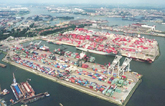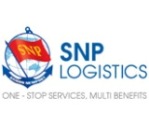Europe's top port Rotterdam is getting congested as surging container imports from China overwhelm deep-sea terminals and interrupt feeder services to smaller regional ports.
Unifeeder, a leading container feeder carrier, said it is facing "serious operational problems" at Rotterdam terminals which are causing delays and short-shipments of cargo to and from Baltic and Scandinavian ports.
Other major north European ports also risk congestion during the summer because of what Maersk Line, the world's biggest carrier, describes as an "unprecedented" surge in traffic in most trade lanes.
Unifeeder says it hasn't been able to maintain its schedules because of delays of up to 36 hours on both northbound and southbound services out of Rotterdam.
The Danish carrier has pooled some services but can't guarantee it will meet calls by ocean-going carriers.
Unifeeder, which operates 28 ships, plans to introduce a congestion surcharge on August 1 if there is no improvement at the ECT Delta, ECT Home and Euromax terminals in Rotterdam.
ECT and Euromax blame the congestion on increased volume and a shortage of dock workers during the traditional vacation season.
The situation is aggravated by ocean carriers failing to keep to schedule, extra calls by ships picking up empty containers for Asia and the spill over of boxes from Le Havre during industrial action at France's biggest container port.
Rotterdam also is paying the price of success as ocean carriers concentrate more calls on the port.
Cosco, for example, is unloading 80 percent of its cargo at Rotterdam and 20 percent at Hamburg this year compared with a 40:60 split in 2009, according to Wei Jifafu, president of the Chinese carrier.
European ports have been caught off guard by the rebound in cargo from the lows of 2009. Antwerp's box traffic grew 16.2 percent in the first half of 2010 compared with an 18.5 percent year-on-year slump in the same period a year ago.
Rotterdam, which has yet to report first half figures, boosted container traffic by 16 percent in the first quarter, rebounding from a 9.4 percent decline in 2009.
Meanwhile, the German port of Bremerhaven reportedly has been overwhelmed by soaring exports of BMW and Daimler cars because of a shortage of dock workers at BLG Logistics, Europe's largest handler of sea-borne autos, and the late arrival of ocean car carriers.
German car manufacturers exported 395,000 autos in June, 26 percent more than a year ago, and boosted overseas sales in the first half by 44 percent to nearly 2.16 million units.
Exports have been driven by rising demand in the United States and China, partly due to the decline in the value of the euro.
Daimler is trying to re-route some of its exports out of the Belgian port of Zeebrugge from where it already ships Mercedes Benz cars to the UK.
The Journal of Commerce Online













